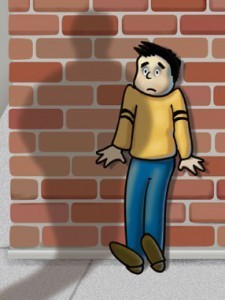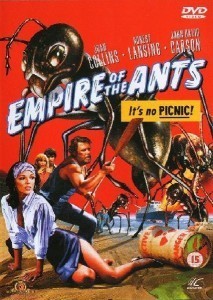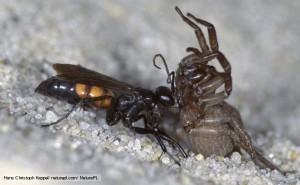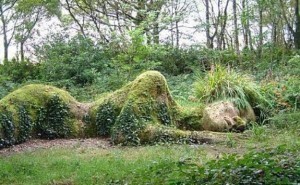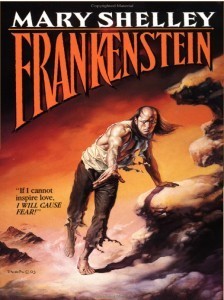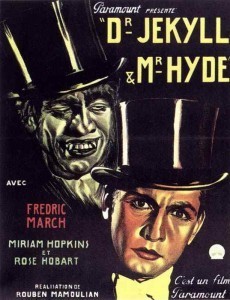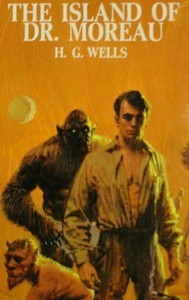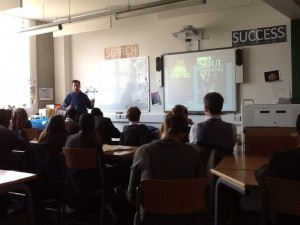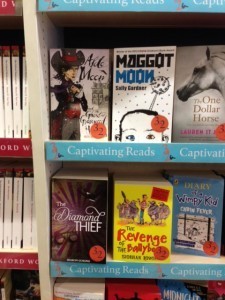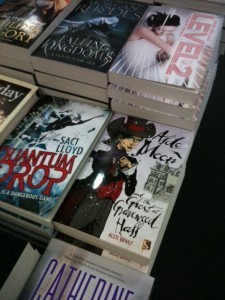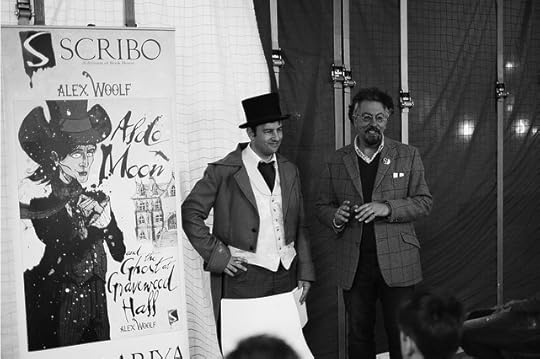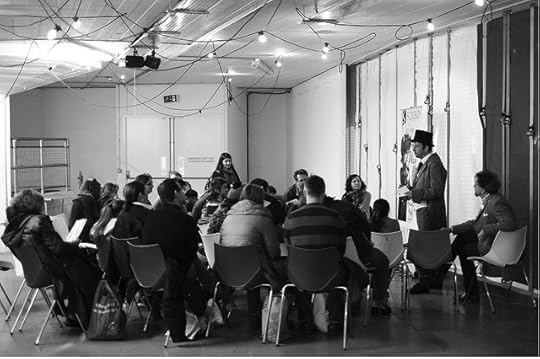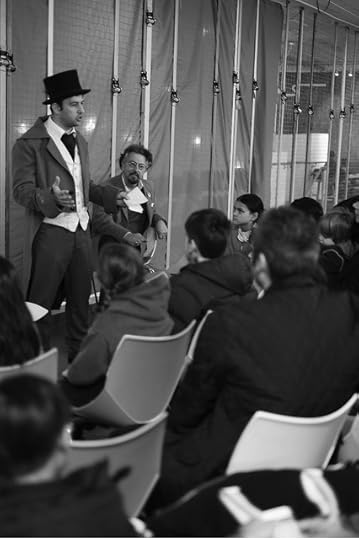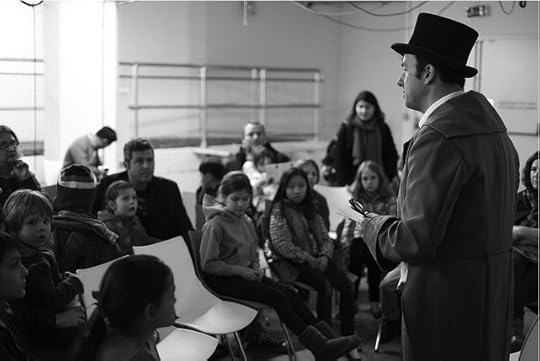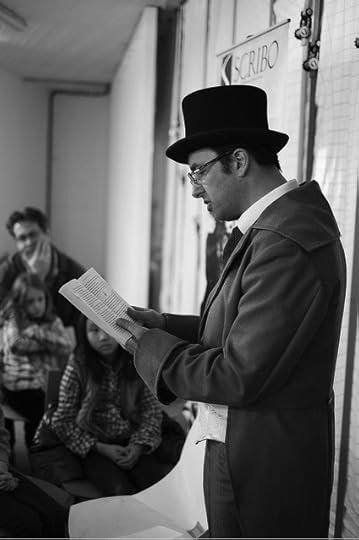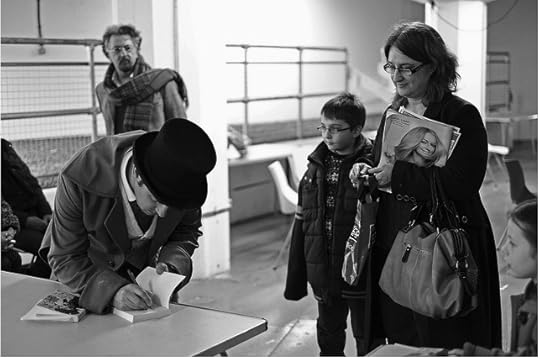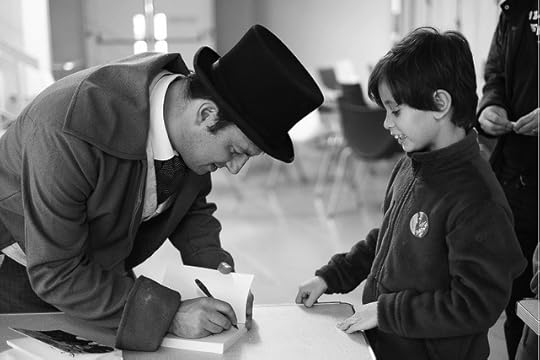Alex Woolf's Blog, page 2
June 7, 2013
Mud, Murder, Meteors and Muswell Hill – My Week
It’s been a mixed-up old week – my favourite kind, in fact – almost dreamlike in its chaotic, kaleidoscopic variety.
Mud
It began in the muddy trenches of World War I, with me putting the finishing touches to a synopsis for a book I’ll be writing in August. We’re taking a comic-book approach with this one, so I was having to come up with humorous speech bubbles on topics such as lice, rats, bully beef and, er, trenchfoot.
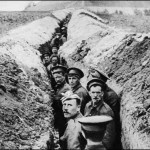 Not easy, really, treading the line between between humour and crass flippancy when you’re discussing the catastrophic conditions on the Western Front. When it comes to things like shellshock, gas attacks and executions for desertion, I don’t personally believe there’s any scope for jokes: you simply have to say what happened and leave it at that. But I think it would be equally wrong to ring-fence the entire war as a joke-free zone. I’m sure a certain amount of black humour helped many of the soldiers get through the nightmare, as this 1915 British Army limerick suggests:
Not easy, really, treading the line between between humour and crass flippancy when you’re discussing the catastrophic conditions on the Western Front. When it comes to things like shellshock, gas attacks and executions for desertion, I don’t personally believe there’s any scope for jokes: you simply have to say what happened and leave it at that. But I think it would be equally wrong to ring-fence the entire war as a joke-free zone. I’m sure a certain amount of black humour helped many of the soldiers get through the nightmare, as this 1915 British Army limerick suggests:
There was a young lady of Ypres
Who was hit in the cheek by two snipers.
The tunes that she played
Through the holes that they made
Were the envy of all the bagpipers.
There’s going to be a lot of World War I histories coming out next year, because of the centenary. I hope that my modest contribution will be picked up by a few people who wouldn’t otherwise choose to read about this subject in a book. While chuckling at the jokes and the cartoon illustrations, they may also learn something.
Murder
When not writing about the trenches, I’ve been continuing work on The Novel. I’m very close to the end now: pretty much the final scene, in fact. The Novel began with a murder and it’s going to end with a murder. I do hate murder, and I hate writing about it. It’s such an extreme act – the ending of a human life – and so far outside of my experience that it’s hard to find the words to describe it. And yet the plot demands it. This second murder is much harder, because it involves a character who I’ve grown to care about over the course of The Novel. It was easy to kill her off in the synopsis – I didn’t know her then.
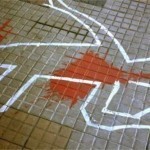 What’s worse is that I personally feel like the murderer. After all, it’s within my power to stop it, even at this late stage – to give the killer a change of heart or to construct events in such a way that he and the victim are kept apart. Instead, this girl, who I created, nurtured, brought to delightful fruition, I must now destroy. Authors are dangerous psychopaths. Really!
What’s worse is that I personally feel like the murderer. After all, it’s within my power to stop it, even at this late stage – to give the killer a change of heart or to construct events in such a way that he and the victim are kept apart. Instead, this girl, who I created, nurtured, brought to delightful fruition, I must now destroy. Authors are dangerous psychopaths. Really!
Meteors
As I write, she still isn’t dead. The deed has not been done. I haven’t had a change of heart, but she’s had a stay of execution, because yesterday afternoon I had a call from a publisher, and they want me to write a book about the Chelyabinsk Meteor – you know, the one that fell on that Russian city in February – so I’m going to have to temporarily down tools on The Novel.
I’ve already written a book about an asteroid strike (due out on 20 June), so I have a little background knowledge about this, which helps. Trouble is this new one is part of a series on disasters (tornadoes, earthquakes, tsunamis, etc), and as disasters go, Chelyabinsk wasn’t particular disastrous. There were no fatalities, just lots of injuries and building damage.
 The incident doesn’t particularly stand out as a natural disaster compared to, say, the 2004 Indian Ocean tsunami, or Hurricane Katrina, but in some ways it’s more frightening, because it reminds us of a threat from a completely different direction – above – and of an entirely different order of magnitude. Earth-based disasters may kill thousands, even hundreds of thousands, but if an asteroid of sufficient size ever hit us, it could wipe out all life on Earth!
The incident doesn’t particularly stand out as a natural disaster compared to, say, the 2004 Indian Ocean tsunami, or Hurricane Katrina, but in some ways it’s more frightening, because it reminds us of a threat from a completely different direction – above – and of an entirely different order of magnitude. Earth-based disasters may kill thousands, even hundreds of thousands, but if an asteroid of sufficient size ever hit us, it could wipe out all life on Earth!
Of course we’re watching the skies closely, and we know there are potential collisions from large asteroids in 2080 and 2182, and hopefully by then we’ll have developed technologies to deflect or destroy them before they hit us. But there are also thousands of smaller Near Earth Objects, such as the Chelyabinsk Meteor, which we’re not looking out for and which could slip through the radar with devastating consequences. (It turns out that if the meteor had come in at a more vertical trajectory, it could have destroyed the city.)
 Muswell Hill
Muswell Hill
Yesterday evening, I forgot all about the mud of the trenches, murder and meteors, and played a delightful game of tennis at a tiny little tennis club in the heart of residential Muswell Hill. It was a perfect English summer evening. Even the midges decided to refrain from spoiling things. The club resembles a large back garden with a descending lawn bordering the red clay courts and the modest clubhouse. Virtually invisible from the road, with a discreet entrance hidden within the shrubbery, it’s a wonder we even found it. The members are delightful and a little eccentric. One said the club has been here for 400 years, and I could almost believe it! We won the game, in fading light, then settled down for a delicious moussaka and a beer. Fabulous!
May 31, 2013
I know I shouldn’t be writing this…
I’m trying to write a crucial scene of The Novel. It’s the scene when the two main characters open their hearts and minds to each other for the first time…
Or rather I’m doing a very good job of not writing it. It’s taken me a few days to realise that what seemed like essential tasks were in fact displacement activities designed to avoid tackling this key scene. Checking Facebook and Twitter, exercising the gerbils, practising ‘Bridge Over Troubled Water’ on the piano, watching the French Open, writing this blog post…! These are all things I could save for non-work hours, or else delegate to a passing child.

Displacement Activity
I realise I must fear writing this scene because it’s so easy to get this kind of thing wrong. I positively relish action scenes, suspenseful scenes, scary scenes. They almost write themselves. They use a very well-exercised part of my brain – the linear, masculine, step-by-step, problem-solving part.
A conversation, however, particularly between two people I’ve come to care about, is a much more daunting prospect. I fear disappointing the readers, who will hopefully have come to care about these characters by this stage of the story. More importantly, I fear letting down the characters by not being fully ‘in their voices’ – by forcing my words into their mouths. They’re living, breathing people. I’m just a medium for their expression. I need to take a step back, and that’s quite hard as an author, particularly when I have the needs of the plot to consider.
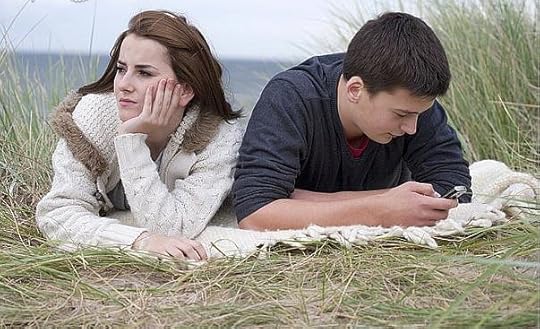
When's he going to get us talking?
I wrote a first draft of the conversation yesterday, and it didn’t go too well. Character B is not behaving herself. Or rather, by being true to herself, she’s not doing what I want her to do. She’s being obstructive. Maybe that’s a good thing. Maybe I should try and bend the plot a little in order to give her some breathing space.
It’s funny, writing this post has suddenly got me in the mood to have another bash at it. Maybe I’ll do that now. Right after I’ve made myself a coffee…
May 23, 2013
Soul Shadows photo competition
Reading Groups For Everyone are excited to be running a fun photo competition with Curious Fox to celebrate the publication of their new horror book Soul Shadows by Alex Woolf. One lucky young people’s reading group will win 10 tickets to the cinema and a reading group set of Soul Shadows.
The competition
To be in with a chance of winning 10 cinema tickets and 10 copies of Soul Shadows for your reading group, all you have to do is take a photograph of your shadow. Scare us or make us laugh, just be creative with your shadow snaps! The winning group will be chosen by the author Alex Woolf.
Submit your shadow photographs to juliana.oliver@readingagency.org.uk by June 10th.
For some inspiration read a sample of Soul Shadows (click on ‘Google Preview’), and have a look at some of the Curious Fox team’s shadow photos.
You can also download the competition flier to pass around your reading group.
About Soul Shadows
Estelle thinks that a stay in a remote cottage will give her the peace and quiet that she needs, but the nearby wood holds a terrible secret. Can she and her friend Sandor discover what s going on in the mysterious military lab, before it’s too late? Shadows come to life, and can be good or bad, depending on who is controlling them …
Terms and conditions:
By entering the competition you agree to these terms
1. One entry per individual
2. If the group reviews the book this review will be promoted by Curious Fox but does not influence the competition
3. Runner up group will receive five copies of Soul Shadows
4. Photos to be submitted to The Reading Agency
5. Closing date is 10 June, winner to be announced within 10 working days and judged by Author Alex Woolf
6. Tickets will be provided in the form of vouchers to a cinema of the winning groups’ choice, to the value of 10 tickets.
7. Competition only open to UK
8. No cash prize alternative is offered
May 17, 2013
My week of bugs and bullies
This week I completed my book on bullying, which was a relief. It was hard to write. Having been bullied at school myself, it brought back a few unwanted memories. Nowadays I get bullied by my kids. Time to stand up for myself, methinks!
It was hard to write for another reason, too. When it comes to non-fiction, I’m much happier writing straightforward factual books on sharks or murderers than I am tackling touchy-feely emotional subjects. I leave the emotional stuff to my fiction. Having said that, I was quite pleased with my bullying book on the read-through. It was concise (I was allowed just 360 words per spread) but it contained some sound, practical advice, a few heartstring-tugging case studies, and even a dash of humour (or humor – it was written for an American publisher).
Today, I should be getting on with my next project, creating some downloadable classroom material for a history series I wrote. But after the trials and tribulations of the bullying book, I feel the need to indulge myself with a bit of fiction. Sirens Call, a horror magazine I’ve written stories for, have put out a request for ‘bug stories’. It’s too delicious a concept to resist. I’m too young to remember the 1950s trashy horror films about giant killer bugs, but that sort of stuff appeals to the kid in me.
I’ve always had a deep fear of insects. Their long thin legs, their shiny segmented bodies and mandibles are just so scary and repulsive, and that fear has grown more profound the more I’ve discovered about the horrible ways they prey on each other and other animals. The spider wasp, for example, preys on the trapdoor spider in a uniquely cruel and gross way. First it paralyses the spider, then it lays its eggs inside the spider’s body. Can you imagine the agony of the still-living spider, as the eggs hatch and the wasp larvae start eating it alive from the inside.
I’m looking forward to writing my story. I already have the outline of a plot. Of course it will feature a giant killer bug and some very scared humans. Can’t wait…
May 10, 2013
Soul Shadows: Inspirations
A major theme of my story, Soul Shadows, is uncontrolled or irresponsible science. The story is about shadows that come to life, and this originally came about through an accident in a lab. Some scientists were conducting experiments with different forms of radiation.
During their experiments, they inadvertently discovered an energy wave which, when chromatically distorted, produced a form of light with very unusual properties. When it passes through an organism, it produces a copy of that organism in whatever medium it falls upon. So, if you’re walking in a forest and this light falls on you, then instead of casting a shadow, a 3-D living copy of you will start to appear, formed from the soil of the forest floor.
These copies were initially weak and lacking in speech or intelligence. They usually died after a few hours. But as the experiments progressed they became stronger, and they became hungry. For, like some carnivorous plants, they could live on light (or their form of it), but they could also live on the flesh of the organism that created them – their progenitor. That means you! The scientists didn’t know what they were meddling with. They were irresponsible. And they are, in some senses, the real villains of Soul Shadows. In exploring this theme of irresponsible science I was following in a long and venerable tradition in science fiction.
Mary Shelley’s Frankenstein, for example, is the tale of Victor Frankenstein, a young scientist who creates a living creature from the parts of dead bodies. But he fails to appreciate the implications of what he’s done, and his creature becomes a monster, a killer, and ultimately a victim of people’s fears. Another young scientist, Dr Jeckyll releases his own dark side in the form of Mr Hyde in Robert Louis Stevenson’s famous thriller.
This was a huge inspiration for the soul shadows, which are, in some senses, photographic negatives of our own souls. Another important influence was H G Wells’ The Island of Dr Moreau, in which a vivisectionist tries, using surgery, to turn animals into humans, and ends up with some very disturbing, and dangerous, animal-human hybrids. There are strong resonances of this work in Soul Shadows in the scientists’ futile and dangerous attempts to humanise the savage and lethal shadows and try to turn them to their own purposes.
I didn’t consciously think about any of these works while I was writing Soul Shadows, but they were there I’m sure, floating around in the background. It’s a powerful theme, and one which is as relevant in today’s world of bioengineering, genetic modification and nanotechnology as it ever was in the past.
May 8, 2013
Soul Shadows Tour – more pictures
Speaking and signing copies of Soul Shadows at Fortismere School in Muswell Hill on 30 April 2013…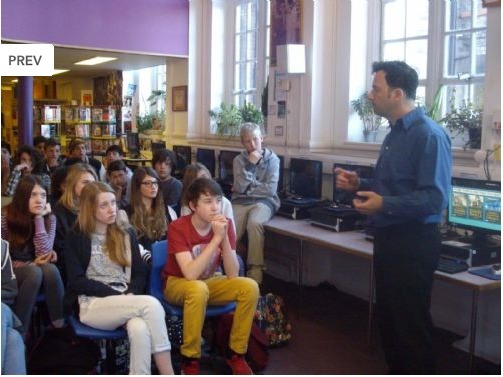
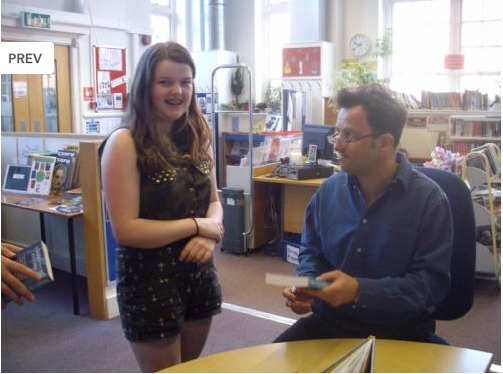
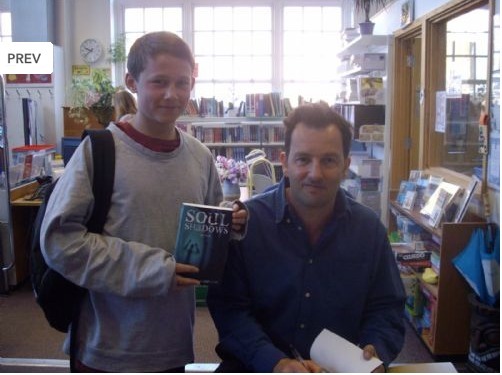
And speaking to students at Heartlands School in Wood Green…
May 2, 2013
Soul Shadows on Tour
I had a brilliant couple of days earlier this week, visiting four schools and speaking to over 400 students about my new novel, Soul Shadows. Thanks to all the teachers, librarians and students at City of London, Fortismere, Highgate Wood and Heartlands, for welcoming me into your schools and for listening to me talk about my books. Your enthusiasm and thought-provoking questions were really inspiring. Special thanks to David Rose, the librarian at City of London School, and Sean Edwards, Haringey Children’s and Youth Libraries Manager, for looking after me over the two days. A fuller blog post about my experience will follow in due course on the Curious Fox website. Here are pictures from a couple of the events. Hopefully more pics to follow…
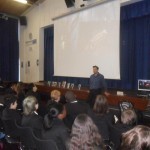
Speaking to Year 8s at Highgate Wood School
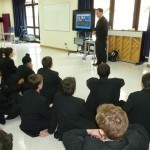
... and at City of London School
April 26, 2013
Soul Shadows – how it all came about…
My novel Soul Shadows was born out of a collaborative effort with a bunch of teenagers who I never met, but who had a profound influence on the shape of the story. How exactly did this come about? Read on, and discover…
I originally wrote the book for a publisher called Fiction Express. I was approached by Paul Humphreys, the MD, who said he was about to embark on a new, experimental form of publishing in which the readers play a big part in determining how the plot develops. Essentially it works like this: the author writes a chapter a week, and at the end of each chapter the author offers the reader three (occasionally two or four) choices for how the plot should continue. These may be moral choices (should the hero stop and help A or go on with his quest?), intuitive choices (should we trust B or C), dramatic choices (should we attack or flee) and many other kinds. Each reader votes for their preferred option, the votes are totalled up, and the author then writes the next chapter based on the most popular choice. It’s a uniquely democratic way of writing a story, and it places the reader at the very heart of the action.

Fiction Express, the company that first published Soul Shadows, now publish interactive books directly for schools.
I was excited by this experiment and eager to take part in it. The only question was: what story should I write? It so happened that I had recently written a horror short story called Shadow of Death. I showed this to Paul and he thought the idea I’d come up with (in which shadows come to life) would work well for Fiction Express. The story would have to be expanded to eleven chapters of about 5000 words each and it would need to be written for a target audience of teenagers. None of this worried me. I’d written full-length novels for teenagers before and had bags of ideas for how to expand my story. The scariest part of it for me, and also the most exciting, was the interactive aspect – the fact that the readers were going to help steer the plot.
As an author, I’ve always been a loner. I’ve never had any desire to collaborate with other authors. I enjoy the solitude of writing and the complete freedom it gives you to come up with characters, plots and worlds to put them in. So the idea of giving up some of this power to the reader was a challenging one, but also quite exhilarating. Paul said it was important, at the outset, to have a starting point for the novel, as well as a clear idea of how it should end. That way, the author can ensure that things will never get completely out of control. He likened the process to a river flowing down a mountainside. We know where the river starts (a mountain spring) and where it ends (the sea). What we don’t know is the exact course the river will take.
Inspired by this image, I set out to plan the parameters of my novel. I wrote the opening chapter. Then I came up with an approximate idea of the ending – who will survive, who will die, who will win, who will lose, etc. After that, I tried to define the edges of the valley through which my river could flow. In other words, what is permissable within the plot and what isn’t? This would help me determine what choices I could offer readers, and prevent disasters like the hero (or, worse, the monsters) dying in Chapter 2, or the police arriving and fixing everything in Chapter 5.

Soul Shadows is a story about shadows that rise up and kill...
When my opening chapter went live on the Fiction Express website, I felt extremely nervous – but not in the usual way I feel nervous when something of mine is published. Despite all my preparations, I knew that the novel had not been written yet – and that its final form did not even exist in my or anyone’s imagination. I had no idea how or even if it would work as a story. The trouble with writing a story in real time is that there’s no going back. Once a chapter is out there, you can’t snatch it back and rewrite it. If you take a ‘wrong turn’ in the narrative, you have to live with it. If something you wrote in Chapter 4 makes your plans for Chapter 8 impossible, too bad. Such worries plagued me incessantly, and I began to wonder if what I was attempting here was simply beyond my powers. What made things worse were all the positive reviews I was getting for my opening chapter. Readers were excited to see how the story would progress. The pressure was on!
Fortunately, whether by luck or the collective wisdom of my brilliant readers, the process seemed to work. Chapter by chapter the story developed, and I was as surprised as anyone at how smoothly the narrative flowed. I mostly agreed with the choices the readers made, and when I didn’t, the results still seemed to work pretty well.
Perhaps the best example of ‘reader power’ in Soul Shadows came with the introduction of the ‘corpse shadow’ about halfway through the book. I was stuck for a third choice at the end of Chapter 5, and Paul said, ‘hey, you know that dead body in the crypt, why don’t we suggest that it generates a soul shadow?’. The idea that a corpse could sprout a living shadow struck me as too ludicrous for words, but I put it in as a choice because we were running out of time. Of course readers went for it in droves, and a new character, the Rev. Edmund Craven (1841–1898 + 2013), was born – I’d never intended him to be there, but he turned into one of my favourite characters in the entire book!
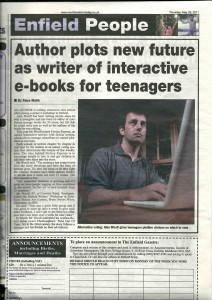
This article appeared in the local paper while I was writing Soul Shadows.
March 25, 2013
Aldo Moon in the bookstores…
Imagine Children’s Festival, 16 February 2013
On 16 February 2013, I attended the Imagine Children’s Festival on the South Bank in London, where I talked to kids (and their parents) about ALDO MOON, I read a few passages from the book and signed some copies. Here are some photos from the event.

